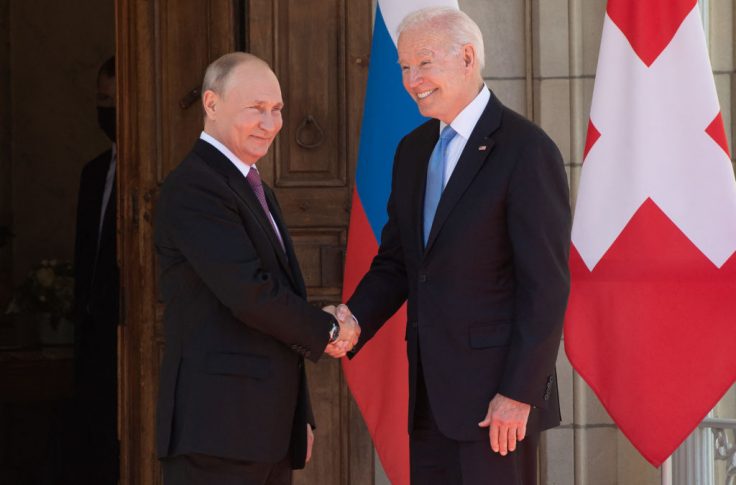Several of Russia's top state-controlled nuclear companies stand to gain billions of dollars in revenue as part of a new nuclear accord with Iran that will waive sanctions on these firms so that they can build up Tehran's nuclear infrastructure, according to a U.S. government-authored document reviewed by the Washington Free Beacon.
Russia's state-controlled Rosatom energy firm and at least four of its major subsidiaries will receive sanctions waivers under a new accord so that they can complete nuclear projects in Iran worth more than $10 billion, according to the 2019 document, which details all the Russian entities involved in these projects.
The document's authenticity was confirmed by a former senior U.S. official, who said it was used by the Trump administration during internal talks about potential sanctions on Iran's nuclear program and its Russian enablers.
With a new nuclear accord being finalized, the Biden administration has repeatedly guaranteed Russia that it will not face sanctions for its work on Iranian nuclear sites, even as Moscow faces a barrage of international penalties for its unprovoked war in Ukraine. Already, the Biden administration renewed a series of sanctions waivers to permit Russia's nuclear work in Iran as part of a package of concessions meant to entice both countries into signing a new accord. These waivers were rescinded by the Trump administration in 2020 as part of its "maximum pressure" campaign on Iran.
The removal of nuclear sanctions on Iran will hand Russia's Rosatom a financial lifeline, even as the United States and European nations seek to isolate Moscow for its ongoing assault in Ukraine. Republicans and Democrats are sounding the alarm on these concessions, criticizing the Biden administration for undermining its own pressure campaign on Moscow to ensure that a nuclear deal is inked. Critics of the deal have in recent days seized on the carveouts for Russia following a series of Free Beacon reports outlining how sanctions relief would turn Iran into a "sanctions evasion hub" for Russian president Vladimir Putin.
"Russian state-owned firms stand to gain billions of dollars under a revived Iran nuclear deal and would be exempted from U.S. sanctions," said Andrea Stricker, a veteran nuclear proliferation expert who has closely tracked Iran's program as a research fellow at the Foundation for Defense of Democracies think tank. "Washington should be working to close every one of the Kremlin's revenue streams, not letting Moscow enrich itself while it is committing mass atrocities."
Information disclosed in the U.S. government document seen by the Free Beacon shows that four Rosatom subsidiaries—Rusatom Energy International, Atomstroyexport, TVEL Fuel Company, and Techsnabexport—will be given the green light on their nuclear projects at Tehran's Bushehr nuclear plant. This includes supplying Iran with reactor fuel, removing spent fuel, overseeing plant operations, and carrying out new construction on the site.
When the Biden administration renewed sanctions waivers in February of this year, it also gave the green light for Rosatom affiliates to perform work at Iran's Fordow nuclear facility, an underground bunker that Tehran once prepared for its weapons program and that continues to conduct prohibited research.
Russia's TVEL Fuel Co. also gave Iran 20-percent enriched uranium fuel to run a research reactor in Tehran as part of the original 2015 nuclear deal, known as the JCPOA. While the Trump administration outlawed this work, the February sanctions waiver issued by the Biden administration reversed this decision.
Under the new deal, Russia would likely import Iran's enriched uranium—meaning that Moscow could return this material to the regime at any time and allow Tehran to augment its stockpile. This exchange was previously handled by another Rosatom affiliate, Novosibirsk Chemical Concentrates Plant, which could again take the lead in any future uranium swap with Tehran.
The Biden administration has made clear that it will not sanction any of Russia's work on Iran's civilian nuclear program, meaning that all of the work previously taking place under the JCPOA will be allowed to resume.
The United States will "not sanction Russian participation in nuclear projects that are part of resuming full implementation of the JCPOA," a State Department spokesman told the Free Beacon in March. "The United States will take actions as necessary to ensure that U.S. sanctions do not apply to the implementation of JCPOA nuclear-related projects and activities by non-U.S. individuals and entities," the official said.
Richard Goldberg, a Foundation for Defense of Democracies adviser who served on former president Donald Trump's White House National Security Council as the director for countering Iranian weapons of mass destruction, told the Free Beacon that there is no way to fully pressure Russia without taking on its state-owned firms. "You can't claim to have a pressure policy against Moscow and simultaneously lift sanctions to pump Putin's state-owned enterprises with billions," Goldberg said.
